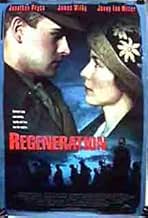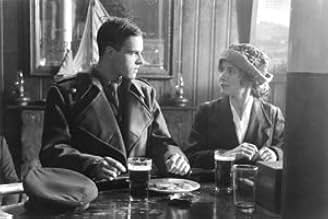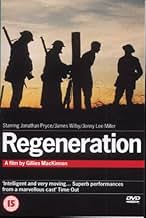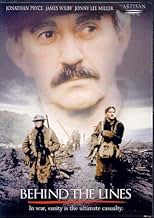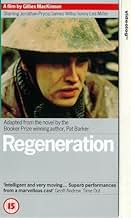Basada en la novela homónima de Pat Barker, "Regeneración" cuenta la historia de soldados de la 1° Guerra Mundial enviados a un asilo por problemas emocionales. 2 de esos soldados son los po... Leer todoBasada en la novela homónima de Pat Barker, "Regeneración" cuenta la historia de soldados de la 1° Guerra Mundial enviados a un asilo por problemas emocionales. 2 de esos soldados son los poetas ingleses más importantes de la dicha guerraBasada en la novela homónima de Pat Barker, "Regeneración" cuenta la historia de soldados de la 1° Guerra Mundial enviados a un asilo por problemas emocionales. 2 de esos soldados son los poetas ingleses más importantes de la dicha guerra
- Dirección
- Guionistas
- Elenco
- Nominada a1 premio BAFTA
- 17 nominaciones en total
- Dirección
- Guionistas
- Todo el elenco y el equipo
- Producción, taquilla y más en IMDbPro
Opiniones destacadas
My main criticism would be that the Rivers character comes across as lacking in professionalism rather than simply sensitive to his patients. The scene where he quarrels openly with Sassoon in the dining room is not only unlikely but untrue to the book. The Prior sub-plot is also grossly simplified and his affair with the munitionette is made to appear more innocent than it is. This is inevitable in a dramatisation, and the oblique references to the future development of the character are probably a mistake, as they will mean nothing to those who have not read the book.
I particularly like the musical score, which adds to the atmosphere without distracting the viewer.
Regeneration is a thoughtful anti-war film where the paradox of war is implied in a Scottish hospital for the treatment of shell shocked officers. The doctor has to get them well so they can be returned to the front lines, where they will more than likely be killed. The script is intelligent and the acting is superb. There are some allegorical scenes which do more to underscore the pigheaded arrogant mentality of the "establishment" which continued a war until quite simply, there was no one left to fight. Even sick men with TB were sent off to fight. Perhaps the saddest aspect of watching this film is when you realize that WWII began 21 years after the first once ended, just long enough for the new generation of soldiers to grow up.
The drama is based on real events, and the performances are quite stunning. Above all, Jonathan Pryce as Dr. Rivers is simply incredible, a man torn between duty and compassion, a doctor on the verge of becoming a patient himself. In a just world, he would have won an Oscar (but hardly anyone, it seems, saw this film on initial release). The handsome James Wilby gives a very fine performance as Sassoon--in fact, I've never seen him in better form. Johnny Lee Miller perfectly embodies the edgy anger, angst, and shame of Billy Prior. And Stuart Bunce brings a remarkably gentle, otherworldly quality to his haunting portrayal of Wilfred Owen. You absolutely believe that this man has a poet's soul; but he finds his voice not by contemplating beauty but by contemplating supreme horror.
There are many scenes from this film I will never forget--particularly, Dr. Rivers' trip to see another doctor cure a patient of being mute by applying electricity directly to his teeth and larynx. This scene is horrifying and, yet, like the rest of the film, restrained, in part because of the way Pryce portrays Rivers' reactions. Another unforgettable scene is the abrupt, shattering ending--but I won't give that away. Suffice it to say that words, especially the words of a great poet, sometimes are more powerful than shocking images.
This is a very intelligent, moving, humane, and important film. What a shame that it has been so overlooked.
The opening aerial shot of the bloody consequences of battle are every bit the emotional and visceral equal of Spielberg's lauded 20-minute opening sequence in Saving Private Ryan. The rest of the film - in my opinion - surpasses Ryan as a whole in terms of its drama, poetry, anguish and thought.
The performances are outstanding. Jonathan Pryce's portrayal of Rivers falling apart at the seams as he adopts the neuroses and trauma of his patients is astonishing. Johnny Lee Miller is also excellent as the (initially) mute soldier, haunted by the brutality of a trench-attack. James Wilby's Siegfried Sassoon is perhaps the toughest role to play in the film and yet he surpasses any prior (or subsequent) performances with a characterisation that swings from harsh to likeable, strong to weak, right to wrong.
All of the numerous storylines are well constructed and followed to their natural conclusion. There are no false avenues; no bum notes; no waste.
The source material is beautifully adapted for the film (by the rare breed of writer-producer, Allan Scott), losing none of its pace or characterisation. The emotional weight so prominent in Barker's novel are perfectly transferred into the movie. How wonderful for a modern film to have non-stereotypical, imperfect lead characters and lack easy conclusions. How beautifully evoked is the friendship between Sassoon and Owen. There is no sacharine sentiment in this movie; nor artificial shock to induce pity; nor a wasted scene or moment of dialogue. Equally, the period look of the film is stunning. Filmed in Scotland, the vistas are beautifully bleak and wintry. The atmosphere of the First World War is all too frighteningly real.
The music, whilst beautiful, is perfectly restrained. Harking back to the films of the seventies, long moments of silence pervade Regeneration. How did things go so badly wrong in the last twenty years in this respect?
Regeneration achieves the very rare distinction of matching (if not surpassing) the beautiful and moving novel on which it is based. Thoughtful film-goers should treat themselves to this wonderful and intelligent film.
¿Sabías que…?
- TriviaThe film used a lot of present and former Territorial Army soldiers as extras for larger scenes. This includes soldiers from 52nd Lowland, 6th Battalion Royal Regiment of Scotland, located in Hotspur street, Glasgow.
- ErroresThe camera and the crane on which it is suspended are reflected in several puddles during the very opening shot (of the battlefield).
- Citas
Capt. William Rivers: I find it interesting that you don't stutter.
Billy Prior: I find it even more interesting that you do.
- Versiones alternativasReleased in the USA in a 96 minute version under the title "Behind the Lines".
- ConexionesFeatured in The 100 Greatest War Films (2005)
- Bandas sonorasJust Before The Battle, Mother
Words and Music by George Frederick Root (As G.F. Root)
Performed by Craig Titus
Selecciones populares
- How long is Regeneration?Con tecnología de Alexa
Detalles
- Fecha de lanzamiento
- Países de origen
- Idioma
- También se conoce como
- Krigets dårar
- Locaciones de filmación
- Overtoun House, Dumbarton, West Dunbartonshire, Escocia, Reino Unido(Craiglockhart Hospital)
- Productoras
- Ver más créditos de la compañía en IMDbPro
Taquilla
- Total en EE. UU. y Canadá
- USD 33,131
- Fin de semana de estreno en EE. UU. y Canadá
- USD 19,593
- 16 ago 1998
- Total a nivel mundial
- USD 33,131
Contribuir a esta página



